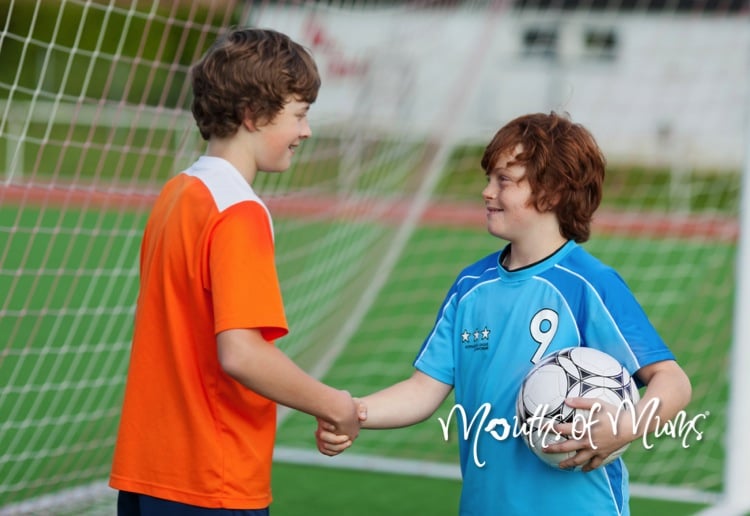Manners are constantly changing from one generation to the next. For example, a handshake in medieval times showed that men were not carrying a sword or dagger in their hands.
Each family, each culture, and each country will have differing expectations of what is appropriate and what is not. This is often a confusing area for parents.
The types of etiquettes and protocols we use today and the reasons we may encourage manners and respect in our children are:
- Tradition or custom
- Thoughtfulness or kindness
- Common sense and safety
- Trust
- A show of openness and friendliness.
When demonstrating and encouraging good manners from children most parents usually begin with please, thank you, hello and goodbye. Often taught at an early age, these are the beginning of a child understanding respectful and grateful behaviours.
Manners at home
Home for children is their first learning ground. Each family member, either by example or guidance, can be encouraged to show respect to the rights and feelings of others. Parents model how to listen when other family members have something to say. The effect of this is that children generally will copy this behaviour and then develop more meaningful relationships and good listening skills themselves.
It is important for members of a family to consider each other’s privacy. Everyone in it has a right to some place that is his or her own. Common examples are:
- Knock on a closed door and wait for permission to enter.
- Get permission to go to someone’s cupboard, desk, bag or other personal space.
- Don’t open anyone else’s mail without permission.
- Gently teach and model to your children what topics get discussed in public and what is discussed within the family unit.
Another important part of good manners is sharing. Most families share the TV set, the telephone, the bathroom and maybe a bedroom or a cupboard or a desk. Children share games, toys and even the attention of parents. Families can also share housework, this means creating habits of age appropriately cleaning up after self and sharing the responsibility for the safety of everyone in the house. Sharing and co-operating within a family unit and taking care of daily chores comes down to personal choice and lifestyle.
Parents need to set the rules or boundaries that they want in place early, clearly explaining them, getting agreement and then following through. This teaches consideration of others and makes it a lot easier in the long term for everyone.
Table manners
Most families have their own table manners that are important to them, which they want to see their children also developing. Here are some general suggestions for your family when at home and eating out:
- Never reach for any food that is not right in front of you. Ask someone to pass it. If you are passing something, don’t help yourself along the way.
- If you put something in your mouth that’s too hot, don’t spit it out onto the plate, discreetly transfer it to a napkin or serviette.
- Don’t talk with your mouth full.
- Avoid elbows on the table.
- Don’t be upset if you spill something. Wipe up with your napkin or serviette.
- When out in a restaurant remember to place napkin in your lap.
- Don’t put bags or handbags on the table.
- Don’t brush your hair at the table.
- A dinner table is a mobile phone or device free zone.
- Use knives and forks and spoons appropriately.
- When finished eating put knives and forks neatly on plate.
- Start eating when everyone is seated and stay seated till everyone has finished eating.
- Thank the cook and excuse yourself from the table when meal is finished.
- Help clear the table.
Being a guest
There are certain things you can consider and teach your children when you are visiting or are a guest. They are:
- Don’t go visiting unless you’re expected, or at least call and check it is okay to pop in.
- Offer to help with tidy up/clean up before you leave.
- Be considerate to the families or other household’s routine.
- Be sure to say thank you for having you.
Manners in public
Unless you are at home or at a friend’s house, you are on public property. These are the times common sense and good manners must prevail. Here are some suggestions for you to consider teaching and modelling to your children:
- Don’t walk in a way that you block others path. I have taught all my children the keep to the left rule – whether on a path or escalator keep to the left.
- If you stop to chat in a walkway or isle step to the side so that people can easily get around.
- Don’t stare at or make fun of others.
- If you have to walk and speak on a phone be aware of your surroundings and mindful of the people around you.
- Keep volume of talking to an appropriate level, and never swear.
- Put your rubbish in a bin.
- If you bump into someone, apologise.
Children learn how to act by the way the adults in their life treat others and talk about other people and things. If a child sees respect, courtesy and consideration practised by their parents regularly, the child will follow suit. If a child sees contribution, acceptance and empathy, they too will show these qualities.
Actions and feelings dominate the way a young child learns about their world – so generally a parent cannot just demand respect and manners from children and expect good results. What works best is a combination:
- Parents can, age appropriately, explain and reinforce the reason and meaning behind their requests so that the child can understand why they are being asked to behave in that way.
- They must model habits of acceptable behaviour and then reinforce outcomes of earned respect or good manners, then children will naturally adopting similar actions without added pressure.
- Appropriately reward the child as they begin to demonstrate good manners, which will encourage more of the same behaviour.
These are simple things that make a huge difference in your child’s interactions and relationships with others as they grow – and with the ability to show manners and respect their sense of worth and well-being will always be strong.
I will leave you with this quote:
“Children are natural mimics who act like their parents despite every effort to teach them good manners.” Author Unknown
Do you have any other suggestions to add that work for you? Please share in the comments below.





















-

-
-
meedee said
- 23 Jul 2021
-

-
-
haldem337 said
- 01 Aug 2016
-

-
-
ella12 said
- 25 Jul 2016
-

-
-
rovermum said
- 25 Jul 2016
-

-
-
mom71495 said
- 23 Jul 2016
-

-
-
mom134803 said
- 23 Jul 2016

-

-
-
mom101628 said
- 22 Jul 2016
-

-
-
mom70876 said
- 05 Jul 2016
-

-
-
BellaB said
- 04 Jul 2016
-

-
-
june11 said
- 02 Jul 2016
-

-
-
mom134803 said
- 24 Jun 2016

-

-
-
mom160421 said
- 23 Jun 2016
-

-
-
mom112217 said
- 23 Jun 2016
-

-
-
squirtsmum said
- 23 Jun 2016
-

-
-
mom93821 said
- 23 Jun 2016
-

-
-
taynik46 said
- 23 Jun 2016
-

-
-
mum4107 said
- 23 Jun 2016
Post a comment11:28 am
11:33 pm
3:57 pm
12:45 pm
8:29 pm
3:46 am
10:51 pm
3:01 pm
12:17 pm
11:02 pm
3:35 am
-

-
-
mom93821 replied
- 24 Jun 2016 , 7:06 am
Reply1:18 pm
9:24 am
7:52 am
6:32 am
6:32 am
5:49 am
To post a review/comment please join us or login so we can allocate your points.